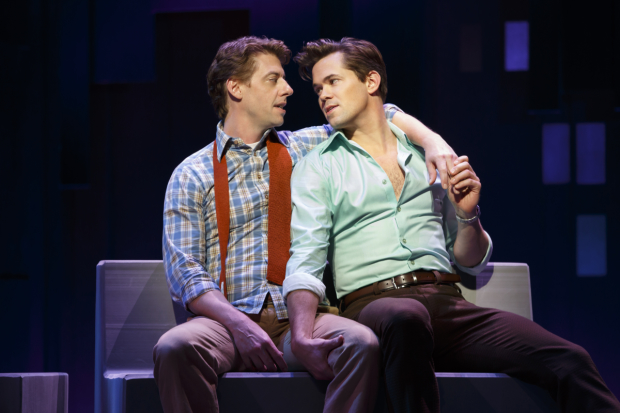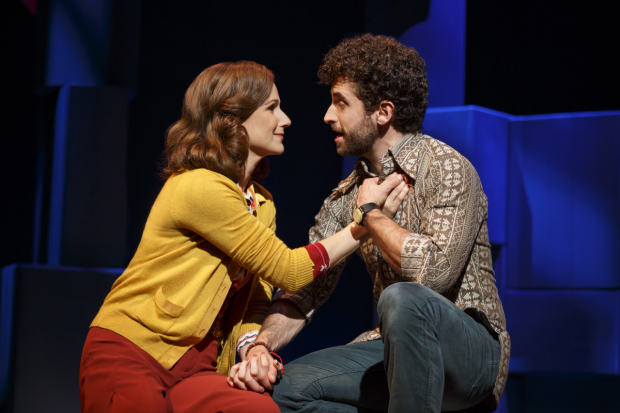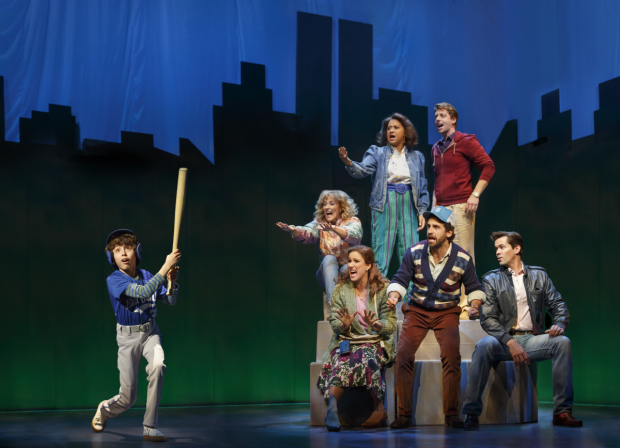Falsettos

(© Joan Marcus)
Four years before Rent and one year before Angels in America, composer William Finn and director and librettist James Lapine presented the AIDS crisis on a Broadway stage in Falsettos. It was a surprise hit, running over 500 performances (including previews) and capturing the 1992 Tony Awards for Best Score and Best Book. The show is now being revived in a new production by Lapine for Lincoln Center Theater in association with Jujamcyn at Broadway's Walter Kerr Theatre. While it is always delightful to hear the composer's idiosyncratic voice onstage, the dramaturgical flaws inherent in the piece don't go unnoticed.
Some of this may have to do with the musical's unique development process: Falsettos is a compendium of March of the Falsettos and Falsettoland, the latter two installments of a trilogy of one-act musicals that Finn first presented at Playwrights Horizons over the course of 11 years (the first, In Trousers, is really more of a sketchpad for a composer just learning to write; it is wisely left out of this iteration). The songwriting is the real reason to see this show: Finn's witty and habitually honest lyrics like, "We’re watching Jewish boys who cannot play baseball play baseball," or the rhythmic chanting of "hepa hepa hepatitis" give his fizzy melodies a slightly bitter aftertaste, like a musical Campari soda. It is definitely an acquired taste as far as musical theater is concerned.
Finn and Lapine make a strong first impression with the raucous opening number, "Four Jews in a Room Bitching," for which they cannot be accused of false advertising: The four male actors of the cast wear long beards and cartoonish Hebrew robes, like they're in a community theater production of Joseph and the Amazing Technicolor Dreamcoat (these are the most fantastical of Jennifer Caprio's well-tailored period costumes). Right before they change back into civilian garb, Brandon Uranowitz spins around like Wonder Woman (Spencer Liff's jokey choreography keeps us laughing throughout). We immediately know what kind of comedy we're in for.
When the story kicks off, Marvin (Christian Borle) has left his wife, Trina (Stephanie J. Block), for Whizzer (Andrew Rannells), his new gay lover. Both Trina and Marvin are in therapy with Mendel (Uranowitz), and they're trying to convince their son, Jason (Anthony Rosenthal) to start sessions. Events turn significantly more complicated when Mendel becomes romantically involved with Trina.
The second act ("Falsettoland'') takes place in 1981 and introduces Marvin's lesbian neighbors, Charlotte (Tracie Thoms) and Cordelia (Betsy Wolfe). Charlotte is a doctor at a city hospital who has begun witnessing a terrible new plague spreading through New York's gay community. Suddenly, the relationship problems of the first act don't seem so big at all.
The drastic tonal swing of the second act requires an emotional gear shift that not every audience member may be able to make. While Finn's beautiful music and gushing lyrics have the power to bring a tear to the eye on their own (see Finn's funereal song cycle, Elegies), his and Lapine's book regularly seems too flimsily constructed to support the heavy lift required of a musical drama about AIDS. The last 30 minutes feel especially rushed and dramatically half-considered. As a result, one is more likely to receive the final scenes with confused detachment than the devastating catharsis the writers clearly intended.

(© Joan Marcus)
That disappointing outcome is not for lack of trying on the part of the cast, all of whom really know how to deliver this material. Uranowitz, in particular, fully endows Mendel with specificity of character and unwavering humanity. Rannells and Rosenthal are also completely believable in their respective roles. Unfortunately, Borle's Marvin is a little harder to grasp: He certainly captures Marvin's selfishness with a bullyboy performance, but we are never able to get underneath his impenetrable exoskeleton.
Standing in a league of her own, Stephanie J. Block astounds us with both her musical prowess and lyrical sensitivity. Her first solo, "I'm Breaking Down," completely stops the show: By the end she is stabbing the air with a butcher knife and belting through a mouthful of bananas while miraculously keeping every syllable pristine. Block brings heaps of heart and humor to her winning performance.

(© Joan Marcus)
Director Lapine keeps the production relatively uncluttered, allowing for a natural flow between Finn's songs (the show is almost entirely sung-through). David Rockwell's set helps facilitate this fluid staging: It begins as a giant block of interlocking pieces, which the cast members take apart and reassemble in seemingly endless ways, like children constructing a fort from couch cushions. As they build and tear down their foam castles, it all feels very safe and consequence free. By the deadly second act, real, hard furniture (like hospital beds) start appearing, confronting these sheltered, pampered New Yorkers with real life. The way they meet the challenge with mirth and love is the most moving aspect of Falsettos.
This near-perfect revival of a decidedly imperfect musical tells that story quite well. Lapine and Finn should be applauded for staying true to the specific time and place of Falsettos without making it feel like a relic, which is crucial because the emotions conveyed by Finn's gorgeously melodic music and hilariously neurotic lyrics — fear, love, and hope for a happier tomorrow — are timeless.











